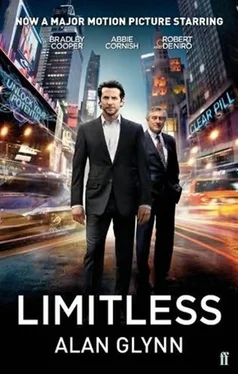Seeming to draw on some final reserve of energy, Melissa then held my gaze and said, ‘Eddie, what are you going to do about this?’
I told her I wasn’t sure, but that I’d be OK, that I had quite a few MDT pills left and consequently had plenty of room to manoeuvre. I would cut down gradually and see how that worked out. I’d be fine. Since I hadn’t mentioned anything to her about the blackouts, however, this felt like a lie. But I didn’t think that under the circumstances Melissa would notice.
She nodded. Maybe she had noticed – but again, even if she had, what could she do?
Outside on Spring Street we said goodbye and embraced. Melissa got a taxi to Grand Central Station and I walked back to Tenth Street.
THE FIRST THING I DID when I got into the apartment was take a couple of Extra-Strength Excedrin tablets for my headache. Then I lay on the couch and stared up at the ceiling, hoping that the pain – which was concentrated behind my eyes and had got steadily worse on the walk home from Spring Street – would subside quickly and then fade away altogether. I didn’t often get headaches, so I wasn’t sure if this one had come about as a result of my conversation with Melissa, or if it was a symptom of my sudden withdrawal from MDT. Either way – and both explanations seemed plausible at the time – I found it extremely unsettling.
In addition to this, the cracks that had been appearing and multiplying since morning were now being prised apart even wider, and left exposed, like open wounds. Again and again, I went over Melissa’s story, my thoughts vacillating between horror at what had happened to her and fear about what might be happening to me. I was haunted by the notion of how easily and irreversibly a careless decision, a mood, a whim, can change the direction of a person’s life. I thought about Donatella Alvarez and found it harder than before to simply dismiss the idea that I’d been in any way responsible for what had happened to her – for the easy, irreversible way her life had changed. I thought about my time with Melissa, and worried, agonized, about those things I might have done differently.
But this was clearly an intolerable situation. I had to take some action soon, or before I knew it I’d be getting sick – sliding into a clinical swamp, developing a whole syndrome of conditions, passing some awful point of no return. So at the very first glimmer of relief from the Excedrin – and this was only the merest dulling of the pain – I got up from the couch and started walking around the apartment, vigorously, as though in some literal sense trying to shake myself into good health.
Then I remembered something.
I went into the bedroom and over to the closet. Trying to ignore the throbbing in my head, I bent down and pulled out the old shoe-box from under the blanket and the pile of magazines. I opened it and lifted out the big brown envelope where I’d hidden the cash and pills. I put my hand into the envelope and felt around, ignoring the sealed plastic bag containing the more than 350 pills that were still left. What I was searching for was the other thing I’d hidden in the envelope – Vernon’s tiny black notebook.
When I found it, I started thumbing my way through it page by page. There were dozens of names and phone numbers in it, quite a few of which had been crossed out, sometimes with new numbers written in above or below the old ones. I recognized Deke Tauber’s name this time, and I vaguely recognized a few other names, but annoyingly – and I checked several times – I didn’t find anyone listed in the notebook whose name was Tom or Todd.
But still, there had to be someone in amongst all these names who could help me, someone I could contact and maybe get some information from.
After all, I thought, who were these people?
Obvious as it was, and even though I’d had the notebook lying in my closet for weeks, it only dawned on me now – this, of course, had been Vernon’s list of clients.
The realization that these people had all used MDT at one time or another, and were maybe still using it, came as quite a shock to me. It also bruised my ego a little, because although it was clearly irrational to think that no one besides myself had ever ex perienced the amazing effects of MDT, I nevertheless felt that my experience of it was in some way unique and more authentic than that of anyone else who might have tried it. This slightly indignant sense of ownership lingered in my mind as I read through the names in the notebook one more time, but then something else of significance occurred to me. If all of these people were on MDT, then surely that meant it had to be possible to do MDT without succumbing to headaches or blackouts, not to mention permanent brain damage.
*
I took another two Excedrin tablets and continued studying the notebook. The more I looked at the names the more familiar some of them seemed, until eventually about half of them had emerged from their earlier obscurity and I started being able to place them. A lot of the names that I recognized were from the business world, people who worked for new or medium-sized companies. There were several writers and journalists, and a couple of architects. Apart from Deke Tauber, none of these people was particularly well-known to the public at large. They all enjoyed some small measure of celebrity, but would be much better-known in their specific fields, so I decided it might be useful to do a little background research into some of them. I booted up my computer and went online.
Deke Tauber was the obvious one to start with. He had been a bond salesman on Wall Street in the mid-1980s – making lots of money, but spending considerably more. One or other of the Gants had known him in college, so he was often around, at parties, in bars, at openings, wherever there was premium quality blow to be had. I’d met him once or twice and found him to be arrogant and fairly objectionable. After the crash in 1987, however, he lost his job, moved out to California and that appeared to be the end of him.
Then about three years ago Tauber showed up in New York again, leading a dubious self-improvement cult – Dekedelia – that he had set up in LA. After a slow start, Dekedelia’s membership grew dramatically and Tauber started producing best-selling books and videos. He set up his own software company, opened a chain of cybercafés and moved into real estate. Soon, Dekedelia was a multimillion dollar business, employing over two hundred people, most of whom were also cult members.
When I trawled through what information I’d managed to find on other people named in Vernon’s client list, I saw the first of two distinct patterns emerging. In each case I looked at, there was – over the previous three or four years – a sudden and unexplained leap forward in the career of the person concerned. Take Theodore Neal. After two decades of churning out unauthorized showbiz biographies and hack magazine work, Neal suddenly produced a brilliant and compelling life of Ulysses S. Grant. Described as ‘a breathtaking and original work of scholarship’, it went on to win the National Book Critics Circle Award. Or Jim Rayburn, the chief of struggling record-label, Thrust, who in one six-month period discovered and signed up hip-hop artists J. J. Rictus, Human Cheese and F Train – and then within another six months had a full mantelpiece of Grammy and MTV awards to his name.
There were others – middle management grunts fast-tracking it to CEO, defence attorneys mesmerizing juries to achieve unlikely acquittals, architects designing elaborate new skyscrapers over lunch, on the backs of cocktail napkins…
It was bizarre, and through the band of pain pulsating behind my eyes I had only one thought: MDT-48 was out there in society . Other people were using it in the same way that I’d been using it. What I didn’t know was how much they were taking, and how often. I’d been taking MDT indiscriminately, one, two, occasionally even three at a pop, but I had no idea if I really needed that many, and if taking that many actually rendered the hit more intense or made it last any longer. It was like with cocaine, I supposed, in that after a while it was just a question of gluttony. Sooner or later, if the drug was there, gluttony became the controlling dynamic in your relationship to it.
Читать дальше












